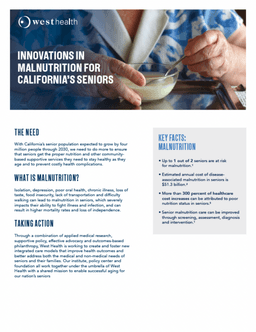Innovations in Malnutrition for California’s Seniors
Addressing Senior Malnutrition: Economic and Health Implications for Healthcare Systems
August 28, 2018
Key Facts: Malnutrition
Up to 1 out of 2 seniors are at risk for malnutrition.
Estimated annual cost of disease- associated malnutrition in seniors is $51.3 billion.
More than 300 percent of healthcare cost increases can be attributed to poor nutrition status in seniors.
Senior malnutrition care can be improved through screening, assessment, diagnosis and intervention.
The Need
With California’s senior population expected to grow by four million people through 2030, we need to do more to ensure that seniors get the proper nutrition and other community- based supportive services they need to stay healthy as they age and to prevent costly health complications.
What Is Malnutrition?
Isolation, depression, poor oral health, chronic illness, loss of taste, food insecurity, lack of transportation and difficulty walking can lead to malnutrition in seniors, which severely impacts their ability to fight illness and infection, and can result in higher mortality rates and loss of independence.
Taking Action
Through a combination of applied medical research, supportive policy, effective advocacy and outcomes-based philanthropy, West Health is working to create and foster new integrated care models that improve health outcomes and better address both the medical and non-medical needs of seniors and their families. Our institute, policy center and foundation all work together under the umbrella of West Health with a shared mission to enable successful aging for our nation’s seniors.
WEST HEALTH’S SENIOR MALNUTRITION INNOVATIONS INCLUDE:
Working to ensure seniors are assessed for unmet needs contributing to the risk for malnutrition.
Improving access to the full array of supportive services seniors need in their homes and in the communities where they live and manage their health, safety and well-being.
Supporting policy changes, increased funding and practice innovations that are required to meet the growing demand for supportive services among seniors. These include, but are not limited to nutrition, transportation, housing, care management and in-home personal and homemaker services.
Increasing awareness about the high incidence of senior malnutrition, its impact and its associated risk factors.
Using standardized tools to improve the identification and diagnosis of malnutrition through screening.
Promoting the delivery of person- centered care to identify and address the social determinants of health that place seniors at risk for malnutrition.
Supporting malnutrition research, and adopting and scaling successful practices that advance comprehensive malnutrition care for seniors.
West Health is conducting the following research initiatives, among others, focused on malnutrition:
Home-based Nutrition, Monitoring and Care Navigation In 2016, researchers at the West Health Institute, Meals on Wheels America and Brown University Center for Gerontology and Healthcare Research began collaborating on a two-year project that investigated how the general health, safety and well-being of homebound seniors could be improved by integrating nutritional, health and safety monitoring into daily meal-delivery services, and by connecting seniors with the appropriate services and support they needed to mitigate risk for loss of independence. Meals on Wheels San Diego is one of two pilot sites where this research is currently being conducted.
Community-based Engagement - The Gary and Mary West Senior Wellness Center Since 2009, Serving Seniors’ nonprofit Gary and Mary West Senior Wellness Center in San Diego has been providing local seniors with a place to connect with other seniors and to receive wellness services, including nutrition and health education, nurse case management, psychiatric nurses, support groups and free legal assistance and counseling related to Medicare and Medicaid.
West Health and The SCAN Foundation’s “We Stand With Seniors…Will You?” public awareness and education campaign focuses on the specific challenges seniors and their families face in accessing high-quality, affordable healthcare, dental care and supportive services and the cost to the state if these challenges are not addressed. Visit www.WeStandWithSeniors.org for more information. Keep up with #StandWithSeniors on social media via Facebook @WeStandWithSeniors and Twitter @WeStandWSeniors.
Downloads

WH-Policy-Malnutrition.pdf
Download